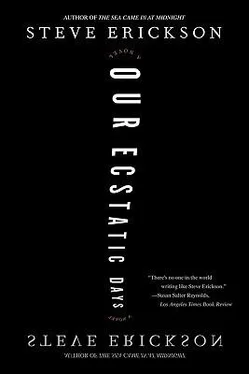the city where he had been conceived, and if once I was convinced that no
not yet submerged scenery around him. The ghost of history, he feels himself grow more corporeal by the moment. He glides through the watery sky of the lake an hour and a half without break until the weak arm of the bad hand throbs with pain. In this moment on the lake, everything about Wang’s absurd life comes to a halt; he’s riveted by a calm still secret to him. He’s riveted, as when he was nineteen years old in the Square, by a resolution beyond rationality, by a wisdom forgotten as soon as he’s seen it. In this moment he has more than passing acquaintance with his own strange courage. After a while he turns to look over his shoulder for where he’s heading; he sees her hotel, not far from the Hamblin where he and Tapshaw, following the sound of a song, once sailed out thirteen years from now. He grows closer to her hotel as twilight grows darker and, just as though his life was exactly timed for such a thing, his final approach coincides with the cry of a child from the waves around him.
He hears her wail for her drowning son from a hotel window. He hears again the boy’s desperate call and turns the boat to the sound; just as though his life is exactly timed for such a thing, he unties his hand from the oar and reaches into the water — nd small fingers reach up and grabs his throbbing arm. With his other good hand, Wang pulls the boy up from out of the lake into the boat. In the boat, holding close to him the nine-year-old soaked and terrified but, as of this new moment, alive, Wang thinks to himself, Someone try telling me this isn’t my son.
The next morning Wang, the woman he called K in his letters, and her son Kim leave the sinking hotel and move to shore. A day later, Wang buys a used car that needs new tires. On their way up Highway 1, Kim rides in the front seat with Wang as the woman sleeps in back; they stop at a shop in San Luis Obispo and get the
matter where I went a lake would have followed me there, now I don’t know, I
boy some new animé posters to replace the ones left behind in L.A. His room is the first they decorate when they rent the new flat in San Francisco that rests at a fork in the fog and overlooks the bay. On their first night in the apartment, staring out the large windows at the blue bay, Wang doesn’t think of Lake Zed but only this, his most fulfilled moment; the next morning, when he makes a quick run to the market for chocolate milk — Kim’s favorite — and his used car that needed new tires suddenly spins out of control on Van Ness and crashes into the oncoming bus, in those final moments before his neck snaps Wang wonders how it is that he, of all people, personally bore witness to both the very moment the Twentieth Century died and the very moment the Twenty-First was born, separated by the twelve shadowyears between them. He’s a little surprised in those final seconds that it should be the young girl with the long gold hair he remembers, who he saw only a few times and whose name he never knew. In those final seconds he would like to believe he’s been redeemed somehow, something about which he would give more thought if he had the time, but in the few seconds he has, the only thing he can be sure of is that the view of the San Francisco Bay from the new apartment the night before was worth everything.
Orphanhood is the bond, then, when Kim meets Saki more than fifteen years later. By the time he’s twenty-five years old Kim is an orphan three times over, having lost first the father who was there only long enough to make a son, then Wang, then his mother to ovarian cancer three years ago in Toronto, where the two of them fled before the Bay Area’s occupation in ’9. Returning to liberated San Francisco in ’18 following the siege of Monterey, Kim sees Saki for the first time when she mysteriously emerges from a condemned hotel at Chinatown’s Dragon Gate looking coolly and fully capable of casting a spell on every man before her.
don’t know, even as I feel like there are so many things now that I do know,
Part Japanese, Saki was orphaned by her mother, a former stripper from Las Vegas who vanished early in the girl’s life — into a religious cult, unconfirmed and dubious rumor has it — and by her American father she’s seen only in her dreams, a strange man who once charted a huge blue calendar that completely reordered history according to the chronology and logic of apocalypse, and from whom the daughter got her electric blue eyes. Kim can’t believe his luck to have a woman so beautiful. He and Saki move in together. When he receives a position at the university as a professor of musicology, Saki goes to work for a map maker, walls around her floating with brightly colored places of indefinite borders, oceans of uncertain shores; although it would make more sense for the couple to live in Berkeley where they work and the rents are cheaper, Kim can’t bring himself to leave a single-room flat not far from where he grew up near Van Ness. If he leans from the upstairs window as far as possible and turns his head sharply north, he can see a blue sliver of the view of the bay that the adopted father of one week who saved Kim’s life saw on the last night of his own life.
Kim marries Saki two months after she becomes pregnant. Angie is named after her grandmother even if it wasn’t the grandmother’s real name but the one she took from an old rock and roll ballad she loved while dancing underage in a Vegas strip joint back in the 1970s. So it is that two generations later Kim and Saki’s daughter has more music in her genes than she knows. When Angie is eight years old, long before he’s entitled to a midlife crisis her father has a ludicrous and cataclysmic affair with a student not nearly as beautiful as Saki; far from only a passing distraction, even after it comes to light the affair becomes an ever more disastrous obsession. It’s as clear to Kim as to everyone else that he’s taken leave of his senses. One afternoon Saki marches Angie to a hotel
even as now I know not only that Kirk’s father is dead but that my own mother
room and bursts in on the rendezvous at a particularly debauched moment, a scene that profoundly traumatizes Angie more than whatever indignant satisfaction on Saki’s part can compensate; in the years to come, she’ll hate the mother for it more than the father. Two years later, the relationship between daughter and father is finally reduced to Kim — now without job or family or lover, and in defiance of a restraining order — suddenly appearing one morning before Angie and her mother on the sidewalk outside the little girl’s elementary school, in rags and pleading for a single embrace, sobbing the little girl’s name as Saki curses him.
Angie never sees him again. He disappears, either to enlist in some distant crusade of some undetermined roman numeral or to fulfill a family tradition of disappearing fathers and mothers. Given this, on some level it doesn’t really make sense Angie would go to the same university as her father and, like her father, study musicology — or it makes complete sense. Perhaps it makes sense for all the reasons it doesn’t. The rational processes of mathematics aside, one chooses what it is she wishes to consider rational about her life; and in fact Angie is not one to set rational processes aside even if, Wang not being her true grandfather, technically his blood doesn’t run in her veins. She works hard in school to the exclusion of everything else. Except for one extremely perfunctory dating relationship that lasts five months with a young computer programmer, her life is consumed bycombinations of music and math (since all music is mathematic), and her theory that as there’s a basis for physical matter so there isfor psychic matter, that within a deconstructed and reassembledmelody there’s to be located the helix of freedom and desire, transcendence and oblivion, even — if she believed in either — god and chaos. She spends her life searching for this helix. By the late ’40s and early ’50s, called a genius by some and a crackpot by
Читать дальше











